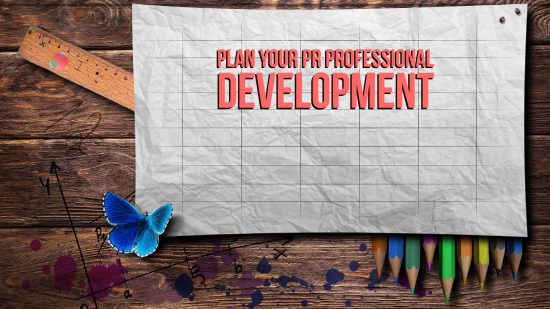 Have you ever wondered how you could continue your professional development, even after you’ve spent years on the job?
Have you ever wondered how you could continue your professional development, even after you’ve spent years on the job?
Professional development isn’t only for younger or more junior PR practitioners!
Two years ago, I set a goal for myself to obtain my charter within a year.
At that time, I had been practicing public relations for 14 years (now more than 16 years), and I knew there was a way I could prove to myself, my clients, and my peers that I was worthy of being recognized as an excellent practitioner.
Professional Distinction
The Chartered Institute of Public Relations’ (CIPR) Royal Charter includes the power to grant the status of “Chartered Public Relations Practitioner” to individuals who meet the required standard of professional distinction.
And while chartered status is already the norm in older professions such as law and accountancy, it is still relatively new in public relations.
Chartered status represents the highest standard of professional excellence and integrity.
As well as reflecting your breadth of experience and achievements, it also shows that you keep pace in a fast-moving profession, updating your knowledge and skills through continued professional development.
Let’s look at what PR professional development might cover:
- Skills, knowledge, and experience
- Ethics
- Leadership
- Strategy
- Business
- Finance
- Tactics
- Software/platforms
- Volunteering
- Mentoring
Volunteering and Professional Development
For years, I’ve volunteered in different roles within the United Kingdom public relations community.
I’ve:
- Served as Chair of CIPR Scotland;
- Served on the CIPR Board and Council; and
- Led a review on behalf of the PRCA on AMECs integrated framework when it launched in 2016 with practitioners around the world.
But what does volunteering have to do with professional development you ask?
Well, I’m a firm believer in ‘you get out what you put in.’
So, with all the time and effort I spend volunteering, I view it as a contribution to my professional development in PR.
From networking and being ahead of the curve in certain areas, to leading in key areas of work significant to our industry, it’s all part of my development.
If you’re a senior PR practitioner who doesn’t believe there are ways you can continue your professional development, then think again.
You have more significant and possibly more exciting opportunities as a senior PR pro.
You can help lead the industry and demonstrate how years of experience in your field have made you who you are today, helping inspire the next generation of leaders.
Talent attraction and retention is a global challenge in public relations.
How do we ensure the younger generation is motivated to pick up the reins and carry on?
Lead by Example
One thing I truly believe in is leading by example.
As senior PR leaders, we must ensure our industry is heading in the right direction and behaving the way it should.
Do we have the right schemes, programs, resources, and people in place?
Whether it’s your business or the industry in general, we must look at the bigger picture.
From simple tasks such as speaking to students, guest lecturing at colleges and universities, taking on interns, and becoming a mentor to guide those who are committed to progressing and stepping up in the industry.
You can set an example and impart your wisdom.
And this all relates back to how you can thrive even when you’ve “been there, done that, and got the t-shirt.”
PR professional development doesn’t need to be about attending a training course or sitting through a webinar.
It can be what you need it to be to enrich your career further.
In my case, I employ a blend of learning, giving, and sharing.
In fact, to retain my chartered status, I had to develop a two-year continuing professional development program for myself.
Not as easy as it sounds!
Plan Your PR Professional Development
If you have no PR professional development plan, and your employer does not offer one, may I suggest you give it some thought and write one for yourself?
You might find some of these questions useful when designing your plan:
- What do you want to achieve in your PR professional development—short, medium, and long-term?
- Are there specific areas you feel you could teach others?
- Are there areas of business where you need to learn more?
- Given recent developments in public relations, and moving towards the PESO model, are there tactics, such as paid media, you’d like to learn more about?
- Although you may be a seasoned practitioner, do you know all the ins and outs of new PR tools? If not, this may be something you should consider. Identify one or two key areas of learning. Perhaps you could do reverse mentoring with someone in your business who’s already a whiz at it.
- Look at your organization and what is already in place. Where are the gaps? What can you do to fill these gaps and include others in the journey?
- Now take a step back. Look at your business/organization. Where is it going and how can your newfound skills help the development of the business?
- What are the hot topics in PR that should be discussed? Could you host a round-table event and invite other senior practitioners to participate?
Your PR Professional Development
You can’t leave your professional development to someone else. It is your responsibility.
So, now you see all the exciting ways you can keep developing no matter what stage you’re at in your work life.
Public relations practitioners are not alone in wanting to achieve ongoing professional development.
Most other professions find it difficult to keep senior practitioners engaged.
I believe you get out what you put in.
I’d be happy to hear your thoughts, and any ideas for PR professional development, in the comments below!